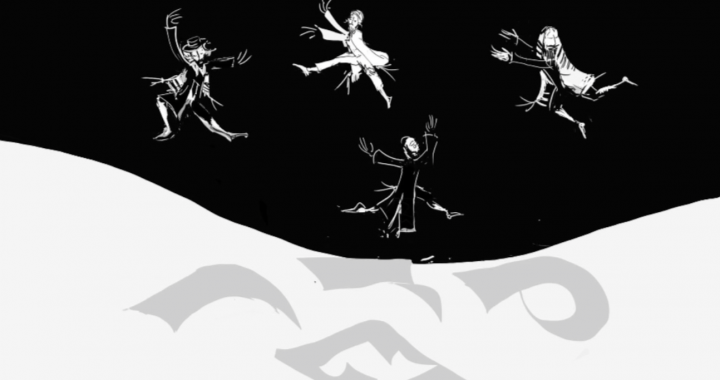Here’s another example where my Father’s telling may differ from your Father’s telling.
The Tale of the Four Rabbis who entered Paradise is another example of the manifestation of four elements in Jewish tradition. Pesach, of course, is filled with them: four glasses of wine, four ‘sons,’ four questions, etc. There are four letters of the Tetragrammaton—the ineffable name of the God of Abraham. Four elements. And here we have the four letters that make up the word Pardes.
That is P-R-D-S or rather: פ-ר-ד-ס — The Hebrew word ‘Pardes’ that means ‘Orchard’ —meaning that orchard, the one we call Paradise.
The rabbis ascend, the tale goes, each revealing his character and his deficits. Except for Rabbi Akiva, who successfully navigates the mysteries of Paradise, and returns to this world to face the world that is, and not just the world to come.
I was told this story slightly differently than you were told it, I’m sure. Again, because my Father’s tales always took a right (or left) turn somewhere along the way.
So just relax about it. Don’t get huffy. A tale is a teaching tool. And each lesson requires a different telling. This one is my legacy. Yours is yours.
And so. In the tale that I was told, yes—the four rabbis ascend into the Pardes. But each according to his capacity.
The First Rabbi enters through the letter פ ℗, the first letter of Pardes. And that letter stands for Pshat—the simple, fundamentalist, literal approach, lacking inquiry, and taking what is seen at face value. And so. The first rabbis enters Paradise. He sees an orchard. He becomes a gardener. And yikes, he steals some cuttings to make a garden of his own. What’s that about?
Now. While I learned to have contempt for the first rabbi, to not trust him, and to never ever emulate him, these days I feel quite differently about him. I’ve since learned to appreciate (mostly from lectures by Danny Matt on Zohar) that pshat is really an opportunity. An invitation to inquiry. The door is ajar. We are invited to walk through, to investigate, and most of all to experience at multiple levels of consciousness at the same time. Pshat is the gateway to the miraculous. But yah, not everyone (or hardly anyone) journeys that far.
I’m also less upset these days about the notion of ‘stealing’ cuttings. Plants want to propagate. I’m sure they at least were happy about the greater distribution. As long as we’re just talking about plants.
The Second Rabbi was the one my Father seemed to identify with the most. And therefore I learned to love him best. He entered through the letter ר ® , the second letter of Pardes. And this is the letter of intellect. The letter Reish stands for Rosh, or Head, and thereby what we use our minds for—and that would be inquiry and analysis. (At least that’s what I was taught).
But the story goes that the Second Rabbi overdid it. Obsessive compulsive disorder. Investigating to the point of driving himself nuts in the process of (over)interpretation. Does this mean that too much analysis is bad for the health? Not according to my Father. For him, inquiry was to be pursued until—
The Third Rabbi knew how to take action. Knew what to do with the analyses and data he had amassed. He entered the Pardes through the letter ד (D), Dalet, which stands for Door. The door to action. And the Third Rabbi, I was taught, was a man of action. An activist. Controversial, yes, but attuned to the currents of history. I think Martin Luther King Jr. Malcolm X. Shabbatei Sevi…
Stop me here, and say (as you should) —what’s with all the men and male images? It’s enough already.
And I would say you’re right.
It’s exactly how I feel about our upcoming presidential election.
We have pshat — Trump — a seeming simpleton, in this case bully, who can ‘steal’ the cuttings of Pardes and maybe (we shall see) get away with it.
We have drush — that would be Bernie — calling for the great American revolution of sorts. Which is a funny way to run for president and stay within the confines of electoral procedure.
And I suppose (finally a female face), we have ‘Hillary’ who attempts to obliterate her husband’s surname and to make herself, thereby, somehow a bit softer at the edges. She is our Remez — giving us analysis and greater complexity that no one seems to want to listen to.
And what of our Fourth Rabbi?
Tradition says the Fourth Rabbi was Rabbi Akiva, who ‘entered in Peace and left in Peace.’ He entered the Pardes through the letter Samech — ס (S), which stands for Sōd, or the hidden, secret dimension of the Pardes. And so, he could see what others could not. Feel it, and know it with his heart as well as his mind.
He, I must say, is not running for President of the United States this year. He was, you may recall, martyred by the Romans.
—mira z amiras

